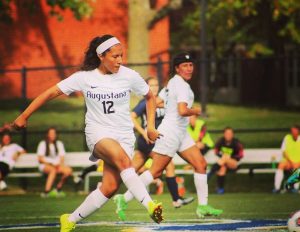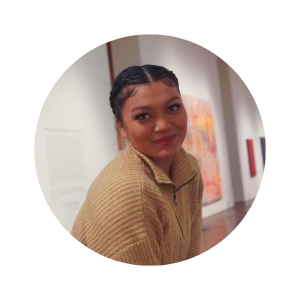Hispanic Heritage Month has been celebrated for decades. Each year, families celebrate through festivals, gatherings and reflecting on the history and sacrifices past generations made. Gabriela Arreguin looks back on her family resettlement history and how far they’ve come since then.
“I am very proud of where my family is now, they didn’t have much in Mexico. Seeing where my grandparents are now, owning houses and thriving, it makes me very happy,” Gabriela Arreguin said as she recalled the history of her family’s resettlement to the U.S.
Gabi’s family resettlement journey to the U.S. began in the late 1970s after leaving La Luz Guanajuato, Mexico, in pursuit of a better life.
“My mom’s side of the family were extremely poor and had nothing in Mexico. As for my dad, his parents wanted him to go to school in the U.S.,” Gabi said. “So, my grandparents sacrificed a lot, they worked in factories their whole life after arriving here,” Gabi continued.
The language barrier, educational background and different cultural expectations were the main factors that limited opportunities for the early generations.
“My parents went to high school, but they weren’t pushed to go to college at the time because our family was new in the U.S. and going to college is not really the tradition,” Gabi said.
Despite what tradition says, Gabi’s parents quickly learned that opportunities may be limited for their children if they followed in their parents’ footsteps by not pursuing higher education.
Recognizing their weakness in resources, Gabi’s parents made it a priority to go out in their surrounding communities and learn about the services offered.
“They knew we were smart kids, so they would put us into programs and get us involved as much as we could in order to network and gain connections,” Gabi said.
Soon enough, Gabi and her siblings joined a program called Upward Bound, a pre-college program for first-generation, low-income families.
“Through Upward Bound, we got a stipend, extra tutoring, free food, and it gave us the opportunity to visit colleges all over the U.S., something our parents wouldn’t have known to do,” Gabi said.
A door of opportunity
Although Upward Bound opened the doors for Gabi and her siblings to pursue higher education, it all came down to what their father instilled in them at a young age to ease off from the financial burden of college.
“A big thing that helped us go to college was soccer, but it was a difficult road getting to that point,” Gabi said.
Gabi expressed gratitude to her dad for inspiring them at a young age to start their athletic journey.
“My dad is a soccer player, so growing up we would always go to his games,” Gabi said. “Soccer is huge in our community, and essentially one of the main reasons for huge gatherings. People would come and sell all kinds of authentic Mexican food,” she continued.
By the time they were old enough, her dad and his teammates formed a soccer team for Gabi and her two sisters and named it the Titrigas, meaning the tiger girls.
The team had much talent, but a financial burden slowed them down from being exposed to college and elite club level.

“At the time we could only afford the International Soccer League, which is not formal, anyone can sign up their team and get in,” Gabi said. “Our parents would sign up us for a hundred dollars a season, where richer kids would play for big clubs that cost over two thousand dollars a season and get all the exposure.”
Becoming first-generation college graduate
As soon as Gabi turned 17, she and her twin sister, Marci, started working to afford to play for a big club named Rockford Raptors FC in hopes of getting recruited by college coaches.
“By the time we tried out and got into the club, most of the girls our age had already been recruited, because they’d been here at a very young age,” Gabi said. “But we joined late due to financial issues and had to work hard to be seen and recognized.”
Their hard work leading up to this point was proven in the showcases, where hundreds of college coaches come to watch the games to recruit players.
And fortunately, both Gabi and Marci were recruited by Augustana College and played successfully throughout their time there, all while making history by being the first generation in their family to get a college degree.
The heart of La Luz
The accomplishments of Gabi and her siblings is a story that the whole village of La Luz and their community in Beloit, Wisconsin can celebrate and take pride in. In the same way, La Luz has also given them pride and rich traditions that they can pass on for generations to come.
The community is tightly knit and people can rely on each other. In Gabi’s words, “We all think the same way and can all be counted on, it’s like you scratch my back and I scratch yours kind of thing.”
Gabi shared that one of her parents’ priorities is to visit La Luz every year.
“It is really important to go back and visit as frequently as possible because that’s our root, it’s important to see where my grandparents grew up, our family history in that town,” Gabi said.
“There is a week in December where the whole week is booked with Quinceanera, weddings and all kinds of celebrations, and people of La Luz from all over the place will go back to reunite and celebrate,” she exclaimed.
Traditions worth preserving
Gabi plans to preserve her family’s traditions for generations to come.
“I want to be able to continue the tradition of going back to La Luz. I want to pass on that pride and feeling of being there,” Gabi said. “Our recipes, the food that our family makes, my grandparents taught us how to make rice the way our ancestors have always made.”
Above all, the Spanish language is the most important part of the culture Gabi wants to preserve.
“For me, I think it is important that they speak Spanish. My parents didn’t want to confuse us with languages at school, so they didn’t push us to speak Spanish growing up,” Gabi said. “But my siblings and I were eager to learn our native language, so we’d speak and learn by speaking to each other in Spanish.”
Gabi expressed her appreciation for her grandparents who not only led the way to a new country, but also preserved and maintained their roots and rich culture decades later.
“My grandparents didn’t have guidance, they did it themselves, now they are guiding us.”
Want to support our work? Consider making a financial gift.

Kler Soe is the Communications Specialist at World Relief Quad Cities. She joined the team after graduating from St. Ambrose University in May of 2023 with a degree in Public Relations and Strategic Communication. As a refugee herself, she hopes to bring awareness to World Relief’s work through stories.

